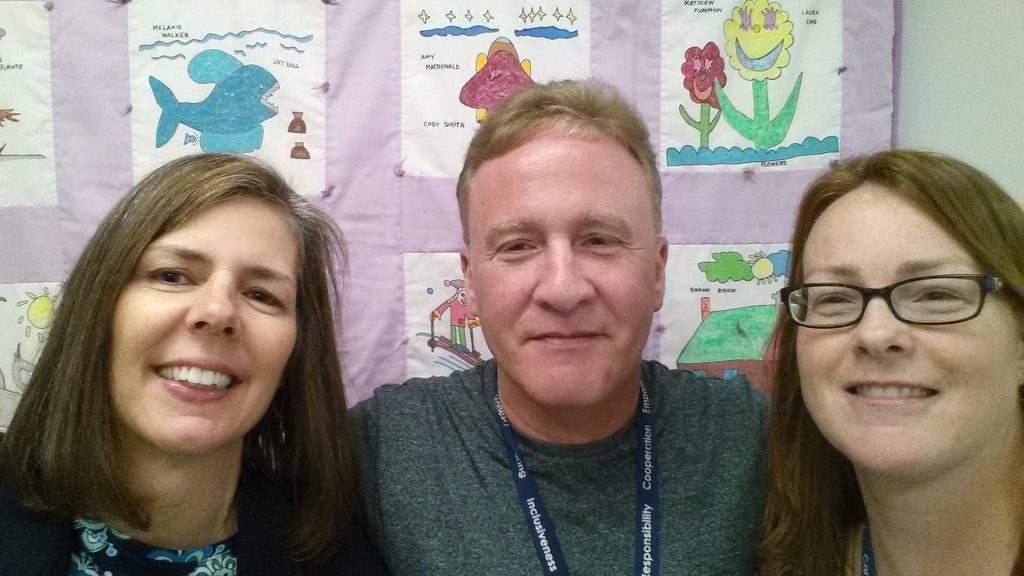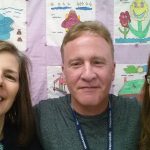Three junior level teachers will work through a collaborative inquiry (Plan, Act, Observe, Reflect) as we explore ways to enhance the content of students’ writing. We will meet face-to-face three times during the school year and keep in touch through online meetings with and without students. It is our belief that students need many opportunities to develop oral language. We feel that a focus on developing strong oral language skills via face-to-face conversations, followed sequentially by the use of technology, will lead to better writing skills.
Team Members
Marie Swift
Simcoe County District School Board
Colleen Elson
Simcoe County District School Board
Steve Oberman
Simcoe County District School Board
Team Photo

Professional Learning Goals
Our goal was to improve the overall writing competencies of junior students by maximizing their use of oral language and the integration of various technology tools and strategies. By emphasizing opportunities for oral language before, during and after writing, the students enriched their vocabulary and sentence structure. This was, in turn, reflected through improved knowledge and understanding, thinking, communication, and application of their writing skills.
Activities and Resources
Teachers met to explore resources as they planned steps to implement rich learning activities for the students. Some examples of classroom activities involved: speech preparation and presentation via Google Hangout, debates within classrooms and with other schools via Google Hangouts, daily activities to scaffold skills involved in the steps of the writing process, use of Adobe Spark and Seesaw to improve oral language skills in preparation for writing and as a publishing tool, use of G Suite (Google tools) to enhance writing throughout the entire writing process, and other experiences that arose as a result of the discussion of current events and/or social justice topics.
Unexpected Challenges
The team felt that the addition of technology within the classrooms was essential and much appreciated, as this added to individual student’s ability to attempt to complete all phases of the writing process using oral language and technology. One challenge was that sometimes there weren’t enough devices available for the students to use. Finding enough time in the day was often difficult.
Enhancing Student Learning and Development
As a result of this project, the students seemed to improve their writing skills and gained a greater interest in writing. Students have demonstrated increased enthusiasm towards all areas of the writing process and reluctant writers have found greater confidence and motivation to engage in oral discussions about topics. Our students were able to write more concisely to express themselves through a variety of publishing methods and throughout oral discussions. Ideally they will be empowered to take the initiative to use their writing skills in various facets of their personal life outside school.
Sharing
Team members have shared ideas and results from this project with grade and division partners, and through a group-created poster, individual learning stories, staff meeting presentation and a proposal for a presentation at the 2017 Bring IT Together (BIT) Conference put on by The Educational Computing Organization of Ontario (ECOO).
Project Evaluation
Our goal was to improve the overall writing competencies of junior students by maximizing their use of oral language and the integration of various technology tools and strategies. We emphasized opportunities for oral language before, during and after writing, and our students enriched their vocabulary and sentence structure throughout this process.
The team feels that we have met our goals set out within the project and we determined this through anecdotal comments, observations and conferences with students, completion of a pre-project survey and post-project survey, and improvement of overall writing appearance and content as noted in assessment and evaluation.
If we could have done something differently, we would have liked to have more time with the team to collaborate, develop more common tasks and to explore other methods of communicating our project with other members of our board.
Resources Used
- EQAO sample assessments
- Class blogs
- Google Drive
- Google Classroom
- Google Hangouts
- Chromebooks and iPads
- Talking to Learn:50 Strategies for Developing Oral Language by Jennifer Glass, Joan Green, Kathleen Gould Lundy
(If we are approved for the Bring IT Together Conference in November 2017, we will add a link to our presentation.)
Resources Created
These resources will open in your browser in a new tab, or be downloaded to your computer.


